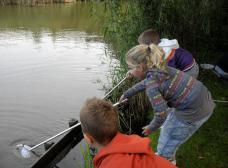Getting schooled for a green future...
During a recent presentation to the Mokopane Business Chamber, Fatima Cachalia, Provincial programme manager of Limpopo Eco-Schools, gave delegates a brief overwiew of what the Eco-Schools programme is all about. This week Northern News reporter Cindy Pretorius sat down with Cachalia for a cup of tea and some more insight into the programme.
Eco-schools is an international programme of the Foundation for Environmental Education (FEE), that is managed locally by the Wildlife and Environmental Society of South Africa (WESSA). The programme operates in over 40 countries worldwide.
But in Limpopo it all started in 2004 when nine schools wanted to do things differently. They decided to adopt the Eco-schools programme and its framework to improve environmental management at their schools. By the end of 2011, 135 schools in Limpopo had joind the WASSA/WWF Eco-Schools programme.
The programme is designed to encourage curriculum-based action for a healthy environment through an on-going and continuous management plan.
There several steps which school must take to register with the programme. The first step is to audit environmental conditions and resource use at their school. Second the school must implement projects to improve their environmental conditions and resources used according to themes. Schools must conduct environmental education lessons and lastly schools must report annually on their progress to the Eco-schools co-ordinators, who convene panels of experts to assess the schools’ work.
Eco-schools practice rain-water harvesting, vermicomposting, permaculture gardening, re-using and recycling, minimising waste, healthy living, water conservation, wetland rehabilitation, solar cooking and clay ovens and a love and respect for nature just to name a few.
By engaging in these activities the learners and teachers almost force the entire community to be introspective and to look at how they view the world and the environment. “We have to ask ourselves if we are doing our share,” explains Cachalia.
With this school activities it also forces the learners to prepare to deal with- and rise to the challenges of a rapidly changing world. These activities can be lessons that can be conducted in any subject. Popular projects in rural and urban areas are food gardens, bringing back indigenous biodiversity, wetland or soil rehabilitation, recycling and measures to conserve water and energy. “Each evironmental improvement must be maintained even as new ones are introduced in subsequent years of registration” Chachalia added.
Eco-schools teach their learners how important it is to be kind to planet earth with activities and projects undertaken to teach valuable lessons. Eco-Schools will, for example, recycle by making candle holders from two litre coke/milk bottles, they will grow vegetable gardens which they can sell for profit for the school, they make food such as pap through solar heating pots to name but a few.
Eco-schools also get rewarded each year for their progress. Bronze awards are given to schools that have successfully completed one theme (a theme can also be considered as a year), silver awards to those that have done two themes and a Green flag once three themes have been done. Schools that have been preparing portfolios with new work for four years and have completed four themes, receive the a Gold award. When a school has completed five themes of the eco-schools programme they will receive international status, 14 schools in Limpopo have reached this award and another 10 schools that have been on the programme for more than five years achieved special merit status.
Chachalia currently manages and oversees the overall implementation of the WESSA/WWF eco-schools programme in Limpopo with funding and support from De Beers. The clusters of schools are further funded and supported by Coca-Cola Fortune, Palabora Foundation, Lapalala Wilderness school, the Department of Water Affairs and the Limpopo Economic Development, Environment and Tourism office.
With the cost of living continuously escalating in South Africa as petrol, food, water and electricity becomes more expensive every day, the Eco-Schools project is a great way of teaching the youth from an early age to save what is important for living and how to generate ideas for healthy and clever living.
For more information on the Eco-School project contact Fatima Cachalia at tel: 015 491 1135 or 082 897 0579.














0 Comments